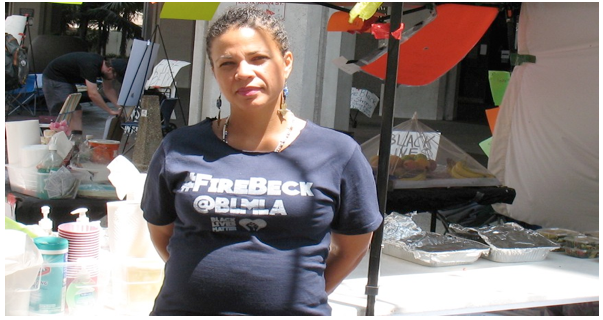CommentsQUEST FOR JUSTICE-This past Saturday marked the 26th day of a City Hall sit-in by activists from Black Lives Matter Los Angeles, a protest that shows no signs of ending any time soon. The group vows to stay encamped in front of the James K. Hahn annex until Mayor Eric Garcetti fires Los Angeles Police Department Chief Charlie Beck or Beck resigns. The action started July 12, soon after the Los Angeles Police Commission ruled that the fatal shooting of Redel Jones, a 30-year-old African American woman, was within department policy. According to police, she had lunged at officers with a knife in Baldwin Hills.
In addition to calling for Beck’s removal (BLM says he leads the nation’s most murderous police department), the group’s other demands of the city and its police commission, as stated in a flyer distributed on site, are:
- The establishment of a partnership with the City Council to develop a reparations policy for police-violence victims and their families.
- Hold police commission meetings that are open and accessible to the community.
- The appointment of community advocates to key commission seats.
- Adhere to quarterly town hall-type meetings as was tentatively negotiated in July of 2015.
In contrast to other BLM protests that have taken place across the country, the action downtown is designed to draw attention to the group’s goals and demands in a peaceful rather than confrontational manner. From the looks of its improvised bivouac, BLM Los Angeles is in it for the long haul. A stereo is on site that provides a steady flow of music, there are about a dozen red and blue tents pitched along North Main Street and in the mall area, and there are tables, chairs, a well-stocked food station and a stack of milk crates that offer a hefty selection of books and other reading material.
“Night before last, we had close to 100 people out here,” says Greg Akili, a BLM activist and organizer. “We also had a large group of people from a Pilipino feminist organization that joined us for the night and donated $300.” Many other donations, he added, have come from white citizens who have stopped by and expressed concerns about police shootings of unarmed black men.
So far, City Hall and the LAPD have been noticeably tolerant of the protestors – which wasn’t the case in January of last year, when activists camped outside LAPD headquarters were eventually evicted, with two members being arrested. There have been some minor disputes with the police involving the placement of the tents and when they have to be taken down during the day, notes Courtney Echols, a volunteer and University of California, Irvine PhD candidate studying racial violence.
Rudy, another BLM volunteer, told Capital & Main that sometimes during the night cops “buzz” the site with their sirens, trying to disturb those asleep, but otherwise the activists have been left alone. Akili theorizes that the reason for the soft treatment is because the mayor is currently on business in Rio de Janeiro (to “meet with international sports officials and hone the city’s bid to host the 2024 summer Olympics,” according to the Los Angeles Times), and because, as Akili claimed, “they’re ignoring us, just hoping we will go away.”
It is hard to imagine a conclusion that would be satisfactory to all concerned. There is no shortage of optimism among BLM members, however. Melina Abdullah (top photo ) is a BLM organizer and tenured professor at California State University, Los Angeles, where she chairs the Pan African Studies Department. When asked if she thought the outcome of the protest would be positive, she answered without hesitation: “We are here to stay, and we will be successful.”
(Lovell Estell III is a Los Angeles-based freelancer who spent nine glorious years as a member of Ironworkers Local 416. His interests are American history, chess and theater. This piece first appeared at Capital & Main.) Photo: Lovell Estell III. Prepped for CityWatch by Linda Abrams.
Explore
Our mission is to promote and facilitate civic engagement and neighborhood empowerment, and to hold area government and its politicians accountable.

 CityWatch Los Angeles
Politics. Perspective. Participation.
CityWatch Los Angeles
Politics. Perspective. Participation.
04
Fri, Apr















